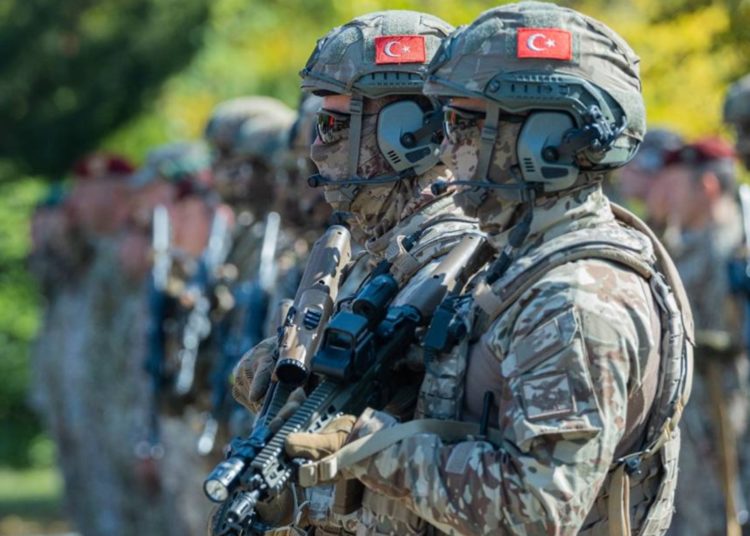Abdullah Bozkurt/Stockholm
More evidence has recently come to light which further confirms that the seizure of the Turkish Consulate General in Mosul by the Islamic State in Iraq and Syria (ISIS) in June 2014 was knowingly allowed by the government of President Recep Tayyip Erdoğan to make room for negotiations with the terrorist group, release ISIS detainees and tap into smuggled oil.
Öztürk Yılmaz, Turkey’s then-consul general in Mosul, said on November 13 he believes some people in the government sold him and the other hostages out in order to benefit financially from ISIS oil in Syria.
“I had resisted [as a hostage] for 101 days. … But the low lifes here, the dishonest people [government leaders], threw us under the bus. They cooperated with ISIS to get money and oil in Syria. They sold us out,” he told fellow party members at a political convention.
Yılmaz retired from the foreign ministry and ventured into opposition politics, eventually establishing the Renew Party (Yenilik Partisi). As a man who knew all the secrets of the hostage saga, he decided to spill the beans, publicly accusing Erdoğan and his associates of cooperating with ISIS in a clandestine deal.
He said he had sent cables and made hundreds of phone calls as ISIS approached the consulate, providing coordinates for ISIS fighter units but couldn’t get Turkish authorities to launch airstrikes on the advancing ISIS troops. He also revealed that Turkey had secretly pulled out all intelligence officers from the area before the seizure, another smoking gun that indicates the secret cooperation with ISIS.
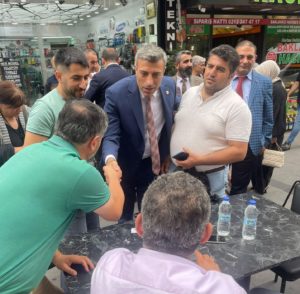
The emergency cables and reports he sent to the foreign ministry in Ankara disappeared, and for that he accused then-foreign affairs undersecretary Feridun Sinirlioğlu, the number two at the ministry at the time, of playing a key role in the plot. His calls to Sinirlioğlu during those 101 days of captivity with a phone he kept hidden from his ISIS captors remained mainly unreturned.
In an interview he gave on November 28, the former diplomat provided further details on how the consulate fell to the advancing ISIS troops, saying that some members of the security detail recently deployed to protect the consulate cooperated with ISIS. It appears Erdoğan did not want to leave anything to chance and sent a select team of guards to the consulate for a smooth carrying out of the plot.
Talking about a special operations police officer (Özel Harekat Polisi) identified only by the initials A.Y., Yılmaz said: “The man is an ISIS member. … He was deployed and arrived a few days before the [ISIS] raid. He had signed up for watch duty at the gate. It turned out that he also spoke Arabic. This opened the door to the ISIS militants and forced the consulate personnel surrender to ISIS. He had all the guns collected. This is the person who was opposed when I ordered the guards to open fire and shoot at ISIS.”
On December 7, three weeks after making public accusations of the government conspiring with ISIS, Yılmaz was injured in a knife attack by a man identified as Serhat K. at his office in Ankara. He was hospitalized with multiple knife wounds. He accused President Erdoğan of being behind the attack and vowed to not remain silent despite the attack and threats. The attack is believed to have been a message to him to not speak about the Mosul hostage crisis.
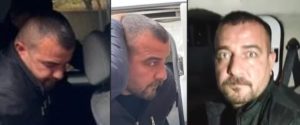
Police detained Serhat at a bus terminal and examined his cell phone, which showed that he had searched the internet for the punishment for murder and the equivalent of $1.5 million in Turkish lira. This suggested that he was offered money to kill Yılmaz, but the former diplomat survived with four knife wounds. According to Yılmaz, the assailant wanted to cut his throat, a signature method of killing for ISIS terrorists.
In his testimony Serhat said he carried out the attack because of Yılmaz’s criticism of government leaders, that he wanted to punish him and that he acted alone. “I have not received any instructions from anyone regarding this attack. I did it of my own free will,” he added.
In a criticism of the government, Yılmaz’s lawyer, Ova Baksi, said she was denied access to statements given by the assailant to the police and public prosecutor although her client was listed as the victim. She said the interrogation of the suspect lasted only a little over three minutes, suggesting that the government was in a hurry to cover up the investigation.
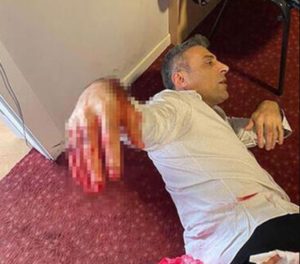
In an interview with a Turkish TV station on December 13, Yılmaz revealed that he had submitted multiple requests to the governor’s office for police protection before the attack but was denied on every occasion. No protection was assigned after the attack, either. He also alleged that the assailant is linked to mafia groups in Istanbul that are protected by the government. There has been no condemnation of the attack issued by government leaders since the incident, which speaks volumes about the government’s complicity according to Yılmaz, who claimed the government is bent on ruling the country with threats of murder, intimidation and unleashing mafia and terrorist groups on opponents and critics.
Similar claims about conspiring with ISIS were also made by Derviş Öztürk, a chef who was one of the hostages at the consulate and now works with Yılmaz in his political party. He said half of the protective detail at the consulate were sympathizers of ISIS and accused the Erdoğan government of abandoning them to the mercy of the terrorist group.
During the days in captivity, Yılmaz managed to make phone calls to Sinirlioğlu on the mobile phone he had kept hidden from ISIS. That communication was something Sinirlioğlu and other Turkish officials including Hakan Fidan, the head of intelligence agency MIT, did not factor into their original plan. They had to make sure the calls were not registered or leaked.
According to Yılmaz, Turkish officials leaked information about the stashed phone to ISIS.
“I had two phones. When ISIS started collecting phones, I handed over one of the phones and did not give them the other. I dismantled the phone and hid it since I had to communicate with the government. I spoke in secrecy. I provided details [to Sinirlioğlu on the phone while I was] in the bathroom. The battery was dying, and I couldn’t trust anyone. I had to keep it all secret. After I made the calls, ISIS started to conduct searches. How did they know I was making phone calls? It turns out they were getting the information from Ankara. They [officials in Ankara] wanted to have my phone seized. After each call, ISIS carried out a search,” Yılmaz said.
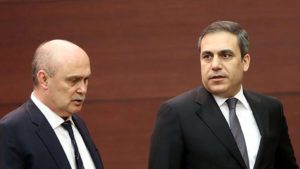
Sinirlioğlu urged Yılmaz not to call anybody except him and to never tell anybody about what was going on at the consulate. The emergency call center, set up by the foreign ministry for family members concerned about the hostages, were not provided any details by Sinirlioğlu or any other senior staff at the ministry.
Sinirlioğlu, who served an unusually long time as undersecretary at the foreign ministry, has been a loyal confident of Erdoğan, with whom he plotted dozens of clandestine operations, many illegal, including staging a false flag military intervention in Syria. He was one of the ardent supporters of armed conflict in a leaked recording in March 2014 in which he, Turkish intelligence chief Hakan Fidan and others are heard discussing the possibility of an intervention in Syria in a false flag operation conducted by Turkish intelligence agency MİT.
Interestingly, Sinirlioğlu was hawkish at the meeting and insisted on a military invasion of Syria, while Fidan was proposing ideas on how to create a pretext, saying: “If needed, I would dispatch four men to Syria. [Then] I would have them fire eight mortar shells at the Turkish side and create an excuse for war.” However, the military resisted the idea until 2016, when the Erdoğan government managed to purge nearly all NATO-affiliated officers who opposed war in Syria after a false flag coup attempt.
Turkey’s military operations in Syria since then have given jihadist groups including ISIS and al-Qaeda breathing room, especially in Idlib, where prominent ISIS figures including former ISIS leader Abu Bakr al Baghdadi, who was killed in 2022 by US forces, found sanctuary.
The claims of the former Mosul consul general of how the Erdoğan government cooperated with ISIS during the hostage crisis were also corroborated by former Turkish military officers. At the time, the elite Special Forces Command (Özel Kuvvetler Komutanlığı, or ÖKK) was ordered to set up a special team to launch a raid on ISIS in Mosul, for which the team started planning for contingencies and training.
According to the testimony of Turgay Perişan, a sergeant in the ÖKK, the team, whose members were drawn from various battalions based on their skills in close combat and experience in nighttime free fall parachuting, was set up and ordered to start training in secret to storm the consulate. Capt. Mehmet Emin Tüzel, who was team commander of this select unit, explained in court on November 13, 2017 how preparations were made for the highly classified mission.
Their testimony was given during a trial concerning a coup attempt in Turkey in July 2016. The officers were tried for alleged involvement in the abortive putsch although they denied having anything to do with it.
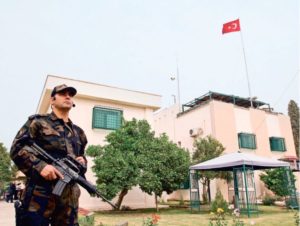
“The success of the hostage rescue operation, which could have been carried out without harming the hostages, required the penetration into the target area without the notice of the terrorists. The only way to achieve this was to infiltrate with a free fall parachute operation at night from a high altitude,” he told the court. Tüzel was among 36 members of the unit singled out for the mission.
In his testimony in court on May 5, 2017 Col. Osman Kılıç, former chief of staff to Chief of General Staff Gen. Hulusi Akar, said in total some 60 to 70 people trained for three months. The team studied the building layout, identified drop and raid points, gathered intelligence on the ground such as how often and by what means food deliveries were made, the guard shift cycle, the number of ISIS militants and their weaponry, ammunition and explosives in the building.
“One plan was abandoned due to the gathering of people in a market near the [consulate] building before the Muslim Feast of the Sacrifice [Eid al-Adha],” Kılıç added. Most of the simulations took place in an underground facility at ÖKK headquarters in total secrecy, and team members were completely cut off from any communication with the outside.
Şener Kısak, a first lieutenant with ÖKK, told the court on November 27, 2017 that “It was decided to infiltrate by means of a free fall parachute operation as it did not make sense for the infiltration to be carried out by land. The mission was assigned to my battalion, but most of the battalion, including me, had no free fall parachute training and therefore no experience. Upon an order, all military members with free fall parachute experience in the brigade were assigned to my battalion, and I was assigned to another battalion for an operation in the north of Iraq.”
Maj. Adnan Arıkan testified in court on April 2, 2018 that the team had run simulations in coordination with the air force. The ISIS militants’ movements around the consulate building were monitored 24 hours a day to keep the operation plans updated with last-minute details.
While the main team was getting ready with its training in Ankara, a separate ÖKK undercover team was on the ground in Mosul, gathering intelligence and making logistical preparations. Derviş Taş, a first sergeant with the ÖKK, told the court on July 4, 2018 that his battalion near Mosul was ordered to support the rescue mission. He and another ÖKK member scouted Mosul, setting up safe locations for rear support of the mission.
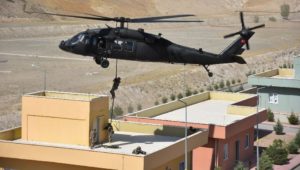
However, as the team was getting ready to make the drop on ISIS in Mosul, the government suddenly ordered the military to stand down. It turned out that the government instructed the intelligence agency to hold talks with ISIS and mandated the release nearly 200 ISIS terrorists. A series of meetings was held between members of ISIS and Turkish intelligence officers.
İlyas Aydın, a senior Turkish ISIS militant who was captured by Kurdish fighters in Syria, told the BBC that at the first meeting, the ISIS team was led by Dr. Wa’il Adel Hasan Salman al-Fayad (aka Abu Muhammad al-Furqan), chief ISIS propagandist and a member of the group’s Shura Council. The second in command at the meeting was Abu Mohammed al-Iraqi, a senior figure within the ISIS inner circle who was responsible for border areas and previously served as a personal bodyguard for Abu Musab al-Zarqawi, the leader of al-Qaeda in Iraq.
The third ISIS militant was Rashed al-Masri, whom Aydın claimed was captured by the US in the Philippines. A Turkish national of Arab origin from Hatay province named Abu Ali al-Turki was present at the meeting as an ISIS translator.
Al-Furqan, who had direct access to ISIS leader Abu Bakr al-Baghdadi, was killed in Raqqah by a US airstrike on September 7, 2016. Zarqawi was killed in Iraq by the US on June 7, 2006.
In subsequent meetings with Turkish intelligence officers, Aydın was also among the attendees. ISIS demanded the release of detained ISIS militants in Turkey and asked for safe passage for fighters who wanted to come from all over the world to join ISIS. Turkey agreed to hand over ISIS militants captured in Syria as well as in Turkey including foreign fighters.
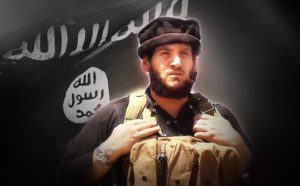
One of them was Abu Usama al-Gharib, an Austrian jihadist of Egyptian origin who had set up a radicalization network across Europe, luring German and Austrian jihadist aspirants to Syria. He was detained in Turkey and faced an extradition request from Austria in 2014. However, he was released as part of this secret deal with the Turkish intelligence agency. Two British nationals — Shabazz Suleman and Hisham Folkard – for whom the UK had issued Red Notices through INTERPOL — were also alleged to be among those who were handed over by Turkey to ISIS in the hostage swap in September 2014.
Erdoğan, then prime minister, implicitly acknowledged a deal in remarks delivered on October 10, 2014. “We rescued 49 of our brothers after 102 days. They ask how we saved them, what we gave in exchange for their freedom. Well, whatever we gave, we gave. What is important is that we successfully carried this out,” he said.
A report by British daily The Times suggested at the time that some 180 militants, including two British citizens, were swapped with ISIS in the deal to release the Turkish hostages.
Main opposition Republican People’s Party (CHP) leader Kemal Kılıçdaroğlu said in a speech in parliament on July 12, 2016 that the ISIS leader who ordered the storming of the Turkish Consulate General in Mosul had been treated at a hospital in Turkey’s border province of Şanlıurfa when he was wounded and that the costs were covered by the Turkish government.
Most of the military officers who were involved in the plan to attack ISIS and rescue the hostages in Mosul were imprisoned by the Erdoğan government in 2016, citing dubious evidence of their involvement in the failed coup of July 15. Dozens of ÖKK officers were mobilized on orders from the General Staff during the July 15 events when multiple intelligence alerts indicated that military installations and bases would be the target of terrorist attacks by ISIS and other groups. The events turned out to be a false flag operation devised by President Erdoğan and his intelligence and defense chiefs to set up a mass purge of the Turkish military.

